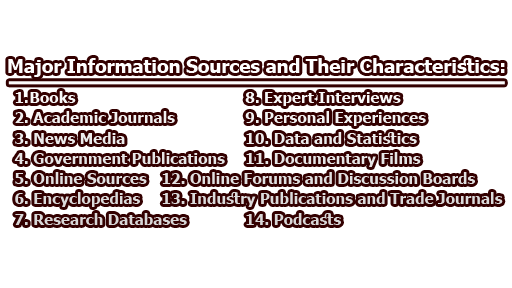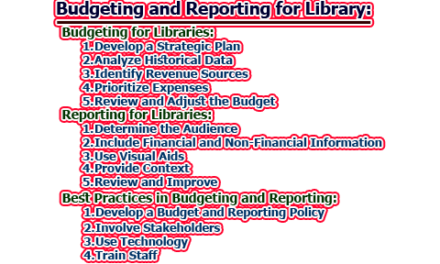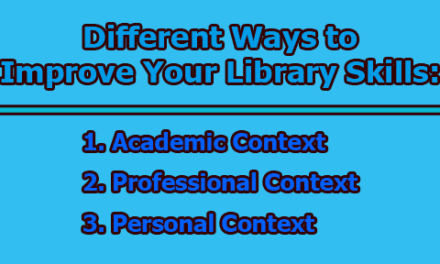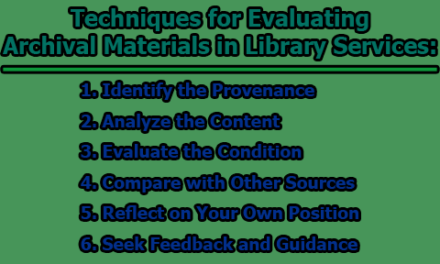Major Information Sources and Their Characteristics:
In today’s information-driven world, it is essential to have access to reliable and diverse sources of information. These sources help us stay informed, make decisions, and deepen our understanding of the world. However, not all information sources are created equal, and it is crucial to recognize their characteristics to evaluate their credibility, accuracy, and bias. This article explores the major information sources and their characteristics, shedding light on their strengths and weaknesses.
1. Books:
Books have long been considered a fundamental source of information. They offer in-depth knowledge on specific subjects and provide a comprehensive understanding of a topic. Books are typically authored by experts, researchers, scholars, or professionals with extensive knowledge and experience in their respective fields. Their characteristics include:
a. Authority: Books are authored by experts, making them reliable sources of information.
b. Depth: Books provide comprehensive and detailed information, making them suitable for extensive research.
c. Publication Process: Books undergo a rigorous publishing process, including peer review, editing, and fact-checking, enhancing their credibility.
d. Currency: While books offer enduring knowledge, they may lack up-to-date information on rapidly evolving subjects.
2. Academic Journals:
Academic journals are scholarly publications that disseminate research and scientific findings to the academic community. They typically follow a peer-review process, ensuring the quality and validity of the information they publish. Characteristics of academic journals include:
a. Rigor: Academic journals require authors to conduct thorough research, adhere to strict guidelines, and provide supporting evidence, enhancing the reliability and validity of the information.
b. Peer Review: The peer-review process involves independent experts evaluating the research before publication, ensuring its accuracy and credibility.
c. Specialization: Journals focus on specific academic disciplines, allowing for in-depth exploration of a particular field.
d. Access: While some journals are open-access, allowing free access to their content, others require paid subscriptions, limiting availability.
3. News Media:
News media includes newspapers, television, radio, and online platforms that deliver current events, news, and analysis. News media plays a crucial role in keeping the public informed. However, it is essential to consider the following characteristics:
a. Timeliness: News media delivers information quickly, allowing readers to stay up-to-date with current events.
b. Variety: Different news outlets cover a wide range of topics and perspectives, enabling readers to access diverse viewpoints.
c. Journalistic Standards: Trusted news sources adhere to ethical guidelines, fact-checking processes, and multiple sourcing to maintain accuracy and credibility.
d. Bias and Objectivity: News media may exhibit inherent biases, influenced by political leanings, commercial interests, or editorial agendas. Critical evaluation is necessary to identify potential biases.
4. Government Publications:
Government publications provide information on laws, regulations, policies, and official statistics. These sources offer insight into governmental actions, public services, and administrative procedures. Their characteristics include:
a. Authority: Government publications come directly from official sources, making them reliable for understanding government activities and policies.
b. Transparency: Governments strive to provide accurate and up-to-date information to the public, enhancing transparency and accountability.
c. Legislation and Regulations: Government publications are crucial for understanding the legal framework and regulatory environment.
d. Limitations: Government publications may present information from a particular perspective, reflecting the government’s interests or political agendas. Cross-referencing with other sources is advisable.
5. Online Sources:
Online sources encompass a vast array of information available on the internet, including websites, blogs, social media, and online forums. Online sources offer diverse perspectives, but their characteristics can vary significantly:
a. Accessibility: Online sources provide instant access to information from various platforms, allowing a global audience to engage.
b. User-Generated Content: Online sources often include user-generated content, which can vary in reliability and accuracy. Verification is crucial.
c. Currency and Real-Time Updates: Online sources excel in providing real-time information on current events, making them valuable for up-to-the-minute news.
d. Quality Control Challenges: With the ease of publishing online, quality control may be lacking, leading to the proliferation of misinformation and biased content. Critical evaluation is essential.
6. Encyclopedias:
Encyclopedias are comprehensive reference works that cover a wide range of topics. They provide general knowledge and serve as starting points for research. Characteristics of encyclopedias include:
a. Overview: Encyclopedias offer concise summaries and overviews of various subjects, making them useful for obtaining a broad understanding.
b. Edited Content: Entries in encyclopedias are typically written and reviewed by subject matter experts, ensuring accuracy and reliability.
c. Limited Depth: While encyclopedias provide a good starting point, they may lack the depth of information found in specialized sources.
d. Print and Digital Formats: Encyclopedias are available in both print and digital formats, with digital versions offering additional multimedia content and regular updates.
7. Research Databases:
Research databases are online platforms that provide access to scholarly articles, conference papers, theses, and other research materials. They offer extensive collections of peer-reviewed information from various disciplines. Characteristics of research databases include:
a. Extensive Coverage: Research databases house vast collections of academic literature, offering access to a wide range of research sources.
b. Advanced Search Capabilities: Databases provide sophisticated search options, allowing users to refine their queries and access specific information.
c. Peer-Reviewed Content: Most articles in research databases undergo a rigorous peer-review process, ensuring the quality and validity of the research.
d. Subscription Access: Many research databases require subscriptions or institutional access, limiting availability to those affiliated with subscribing institutions.
8. Expert Interviews:
Expert interviews involve speaking directly with individuals who possess specialized knowledge or experience in a particular field. These interviews can provide unique insights and perspectives. Characteristics of expert interviews include:
a. Depth of Insight: Expert interviews offer in-depth knowledge and insights from individuals with firsthand experience or expertise in a specific subject area.
b. Contextual Understanding: Experts can provide a deeper understanding of complex topics, offering nuanced perspectives and analysis.
c. Expertise Verification: Evaluating the credentials, experience, and reputation of the interviewees is crucial to ensure the reliability of the information provided.
d. Limited Availability: Expert interviews may not be widely accessible, and their availability often depends on personal connections or opportunities for engagement.
9. Personal Experiences:
Personal experiences involve firsthand accounts of individuals who have directly encountered or lived through particular events or situations. While personal experiences can offer valuable insights, it is important to consider their characteristics:
a. Subjectivity: Personal experiences are inherently subjective, as they reflect an individual’s interpretation and perception of events.
b. Contextual Understanding: Personal experiences can provide unique perspectives and emotional insights, enhancing empathy and understanding.
c. Verification Challenges: Depending solely on personal experiences may lack objectivity and may require corroboration with other sources to ensure accuracy.
d. Limited Scope: Personal experiences offer insights into specific events or situations but may not provide a comprehensive understanding of broader contexts.
10. Data and Statistics:
Data and statistics provide quantitative information about various subjects and are commonly used in research, policy-making, and decision-making. Characteristics of data and statistics include:
a. Objectivity: Data and statistics aim to present information without bias, providing an objective representation of facts and figures.
b. Sources and Methodology: It is essential to understand the sources and methodology used to collect and analyze the data to assess its reliability and validity.
c. Interpretation Challenges: Interpreting data and statistics correctly requires statistical literacy and an understanding of the context in which they were collected.
d. Government and Institutional Sources: Government agencies, research organizations, and international institutions often provide reliable data and statistics on a wide range of topics.
11. Documentary Films:
Documentary films are non-fiction films that aim to present factual information or explore real-world events, issues, or subjects. They combine visuals, interviews, expert commentary, and narrative storytelling to convey information and perspectives. Characteristics of documentary films include:
a. Visual and Audio Engagement: Documentary films provide a visually compelling and immersive experience, engaging viewers through storytelling and cinematic techniques.
b. Expert Insights: Documentaries often feature interviews with experts, providing specialized knowledge and analysis on the subject matter.
c. Interpretation and Bias: Like any form of media, documentaries can have a specific perspective or bias. It is important to critically evaluate the filmmaker’s intentions and consider alternative viewpoints.
d. Varied Styles and Formats: Documentary films can take various forms, such as investigative exposés, observational narratives, or historical retrospectives, catering to different informational and entertainment preferences.
12. Online Forums and Discussion Boards:
Online forums and discussion boards are platforms where individuals can engage in conversations and exchange information on specific topics. These platforms allow users to share their experiences, seek advice, and participate in discussions. Characteristics of online forums and discussion boards include:
a. User-Generated Content: The content on these platforms is generated by users, offering diverse perspectives and experiences.
b. Anonymity and Pseudonymity: Users often have the option to remain anonymous or use pseudonyms, which can impact the credibility and accountability of the shared information.
c. Lack of Moderation: Depending on the platform, there may be varying degrees of moderation, which can affect the reliability and accuracy of the information shared.
d. Need for Verification: Information shared on online forums should be cross-referenced and verified through other sources before considering it as reliable.
13. Industry Publications and Trade Journals:
Industry publications and trade journals focus on specific professional sectors or fields, providing industry-specific news, research, and analysis. These sources cater to professionals and offer insights into current trends, innovations, and best practices. Characteristics of industry publications and trade journals include:
a. Specialized Knowledge: These sources provide in-depth information, analysis, and updates on specific industries or professional fields.
b. Insider Perspectives: Industry publications often feature articles written by professionals, experts, or practitioners, offering firsthand insights and experiences.
c. Subscription-Based Access: Some industry publications and trade journals require paid subscriptions, limiting access to those within the respective industries or institutions.
d. Industry Bias: Depending on the publication’s affiliation or sponsorship, there may be inherent biases or preferences toward certain companies, products, or viewpoints. Critical evaluation is necessary.
14. Podcasts:
Podcasts are audio programs that cover various topics, ranging from news and storytelling to educational content and interviews. They offer flexibility in terms of content consumption and are easily accessible through mobile devices. Characteristics of podcasts include:
a. Diversity of Content: Podcasts cover a wide range of subjects, allowing listeners to explore niche topics or stay informed on current events.
b. Expert Interviews and Insights: Many podcasts feature interviews with experts, providing specialized knowledge and unique perspectives.
c. Informal and Conversational Style: Podcasts often adopt a more conversational tone, making complex topics more accessible and engaging.
d. Potential for Biases: As with any form of media, podcasts can have biases depending on the perspectives and opinions of the hosts or guests. Critical listening and cross-referencing with other sources is advisable.
In conclusion, by understanding the characteristics of major information sources and their strengths and weaknesses, individuals can make informed decisions, deepen their knowledge, and navigate the vast sea of information effectively. Emphasizing critical evaluation, verification, and utilizing a diverse range of sources fosters a more comprehensive and accurate understanding of the world around us.
FAQs:
What are the most reliable sources of information?
The reliability of sources depends on the context and subject matter. Generally, books, academic journals, and government publications undergo rigorous review processes and are considered reliable. Trusted news media outlets with established journalistic standards and fact-checking practices are also reliable sources. However, it is always important to critically evaluate any source and cross-reference information to ensure accuracy.
Are online sources reliable?
Online sources can vary in reliability. While there are reputable and credible sources available online, such as government websites, academic databases, and established news outlets, there is also a vast amount of user-generated content that may lack accuracy or be biased. It is important to evaluate the credibility of online sources by considering the author’s expertise, checking for supporting evidence and comparing information from multiple sources.
How can I evaluate the credibility of a source?
To evaluate the credibility of a source, consider factors such as the author’s credentials, expertise, and affiliations. Assess whether the information is supported by evidence and if it aligns with other reputable sources. Review the publication process, such as peer review for academic journals or editorial standards for news media. Additionally, consider the potential biases or conflicts of interest that may influence the information presented.
Are personal experiences valid sources of information?
Personal experiences can provide valuable insights and perspectives, particularly when it comes to subjective matters. However, they should be considered as anecdotal evidence and not treated as universally applicable. Personal experiences may vary and be influenced by individual biases, limited perspectives, or inaccuracies in memory. Corroborating personal experiences with other reliable sources can help provide a more comprehensive understanding of a given topic.
How can I ensure a balanced understanding of a topic?
To develop a balanced understanding, it is important to consult multiple sources representing different perspectives. Seek out sources with diverse viewpoints and consider their arguments and evidence. Engage with sources that offer different cultural, political, or ideological standpoints. By critically evaluating and comparing various sources, you can develop a more comprehensive and balanced understanding of a topic.
Is it necessary to fact-check information from reliable sources?
While reliable sources typically undergo rigorous fact-checking processes, it is still important to engage in personal fact-checking. No source is infallible, and errors can occur. Fact-checking involves verifying information through multiple reputable sources, cross-referencing claims, and consulting primary sources where possible. This practice ensures that you have the most accurate and up-to-date information available.
Can bias be completely eliminated from information sources?
Complete elimination of bias is challenging since all sources, to some extent, are influenced by the perspectives and values of their creators. However, reliable sources strive to minimize bias by adhering to ethical standards, providing balanced viewpoints, and supporting claims with evidence. It is important for individuals to be aware of potential biases and consider multiple perspectives to develop a more nuanced understanding of a topic.
Are newer sources of information more up-to-date and reliable than older ones?
While newer sources may offer more up-to-date information on current events or rapidly evolving topics, older sources can still provide valuable historical context and foundational knowledge. The reliability of a source depends on its credibility, accuracy, and relevance to the topic at hand, rather than solely its age. It is important to consider a range of sources, both old and new, to develop a comprehensive understanding of a subject.
Can I rely solely on one type of information source for research?
Relying solely on one type of information source may limit the breadth and depth of your research. It is advisable to utilize a variety of sources, such as books, academic journals, reputable news media, and online databases, to gain a comprehensive understanding. By accessing different perspectives and types of information, you can develop a more well-rounded and informed viewpoint on your research topic.
How can I stay updated with current information from reliable sources?
To stay updated, establish a routine of accessing reputable news media outlets or subscribing to their newsletters. Follow reliable experts or organizations in your field of interest on social media platforms. Set up alerts or RSS feeds for specific keywords or topics to receive notifications about new research, reports, or publications. Additionally, regularly check trusted websites and databases that provide up-to-date information in your area of interest.

Library Lecturer at Nurul Amin Degree College










